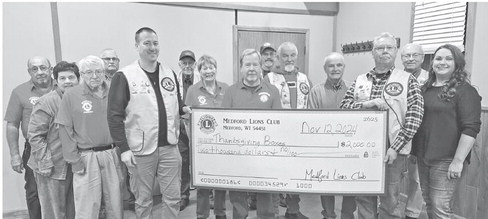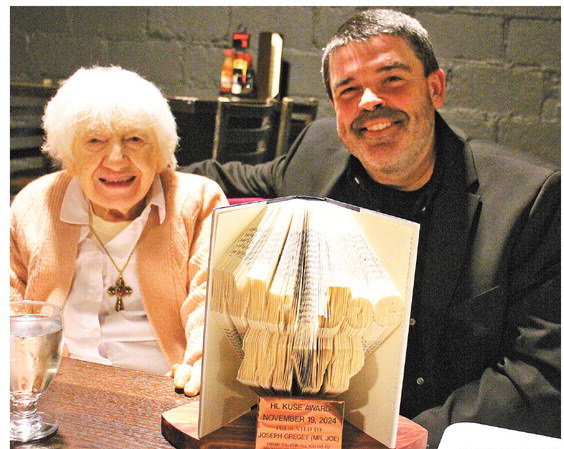Options to alter state’s deer hunt seasons rejected in spring hearing
Respondents representing Taylor County followed suit with most others from around the state, preferring not to tinker with Wisconsin’s deer hunting season framework.
That was one of the major takeaways from results finally released May 6 from the Department of Natural Resources annual spring fish and wildlife hearings and Wisconsin Conservation Congress annual spring county meetings, which were held online April 13-16.
The release of the results was delayed due to a record-setting 64,943 responses that were submitted to the 55 advisory questions on this year’s agenda during the 72-hour voting period. The in-person meetings were canceled in response to the coronavirus pandemic.
“I continue to be amazed by the level of participation by Wisconsinites,” Wisconsin Conservation Congress chair Larry Bonde said. “It shows very clearly how much people care about the natural resources of this state. Given that this was only the second year we offered an online opportunity, and the extenuating circumstances with the COVID-19, I’m thrilled we had this opportunity in place to provide people an avenue for input.”
Of those who voted, 432 indicated they reside in Taylor County, while 1,958 said they recreate in the county.
The results will help guide decision making on potential future rule making. No final decisions have been made on any of the proposals that were presented. The public input results will be considered during the Conservation Congress convention that may be held later this summer and during a future Natural Resources Board meeting.
Full results can be viewed by visiting the DNR website, dnr.wi.gov, and searching keywords “Spring Hearing.”
NRB is advised
A series of advisory questions posed by the state’s Natural Resources Board, or some of its individual members, was a focal point of the agenda.
The first of these questions, question 10 on the agenda, asked if the public favored adding 10 days to the current nine-day gun deer season. That drew a resounding no vote from those who recreate in Taylor County, 1,178-413, and by all participants, 42,208-14,820. No county supported the idea.
However, the next question asking if voters favored eliminating the antlerlessonly holiday firearm deer season if the nine-day season was extended by 10 days, was approved locally 243-126 and by everyone 33,027-20,522.
Question 12 proposed re-establishing a no-hunting period before the first day of the gun deer season with the exception of waterfowl hunting. No change easily drew the high vote those who recreate in Taylor County with 882, followed by 386 supporting a five-day rest period and 291 supporting a two-day rest period. The overall totals went 31,055 for no change, 12,871 for the five-day rest period and 11,237 for the two-day rest period.
Question 13’s proposal to invalidate archery and crossbow buck tags during the nine-day gun and muzzleloader hunts. By a 999-518 count, that was rejected by Taylor County voters. It was denied overall 35,360-18,169.
A proposal in question 14 to shorten the crossbow season drew a more divided response. The idea of an Oct. 1-31 crossbow season, followed by its reopening after the gun season was only defeated by an 830-679 margin among those representing Taylor County and a quite narrow margin of 27,901-25,682 among all hearing participants. It was approved in 15 counties.
Similarly, question 17’s proposal of closing the crossbow season on Nov. 1 and reopening it on the first day of the nine-day gun hunt was rejected locally 927-565 and overall 31,665-20,816. It did not pass in any county.
Question 16, calling for the banning of deer baiting and feeding statewide again failed among those with a Taylor County interest 964-572. It was supported by 21 counties, but the overall vote came out against the ban 29,000-25,904.
There was statewide support for simplifying regulations by eliminating the DNR’s current four deer management zones –– Northern Forest, Central Forest, Central Farmland and Southern Farmland –– and simply allowing harvests to be managed by public-land and private-land antlerless tags. Here, the tally was 1,092-355 and overall it was 35,022-14,340.
The last question from the Natural Resources Board gauged support for a two- to three-week spring bear hunting season in Wisconsin. That was favored by 67 counties in a 32,554-17,347 overall vote. Taylor County voters approved it 963-479.
From the DNR
The Wisconsin DNR only submitted nine wildlife management questions this year and six related to requiring the use of non-toxic shot on state lands and a seventh asked about requiring it for dove hunting statewide. The dove vote was close in Taylor County with 883 voters overall rejecting it, while 626 supported requiring non-toxic shot. While 41 counties voted against the proposed requirement, it actually won the overall vote 27,946-26,674.
Requiring the use of non-toxic ammunition on state-owned or managed lands was approved in 40 counties and by an overall vote of 29,569-26,681 but it was voted down in Taylor County 924-633.
The majority of counties voted against the requirements to use nontoxic shot for pheasants, wild turkeys, ruffed grouse and small game mammals in the series of questions. All drew no votes from Taylor County. But requiring it for pheasants actually won the overall vote 28,597-27,832.
An idea of establishing a special raffle or lottery where the winner(s) would receive several otherwise difficult-to-draw tags and authorizations and the proceeds would go to wildlife habitat management and restoration in Wisconsin was supported in Taylor County 848-681 and overall statewide 32,489-21,680.
Congress highlights
The Conservation Congress brought 37 advisory questions to the 2020 agenda, a few of which also touched on some controversial deer topics. The first two, questions 19 and 20 on the agenda, touched on the unpopular but effective Earn-A-Buck management tool that was eliminated by the state legislature after 2011. The idea of returning authority to the DNR to use Earn-A-Buck was rejected statewide by 66 counties and by an overall vote of 32,885-20,686. It was a fairly close vote among those with Taylor County interest with the nos winning 863-634. The idea of allowing County Deer Advisory Councils to Earn-A-Buck recommendations in their counties was shot down in 65 counties and by an overall vote of 30,151-20,125. It was again close in Taylor County with the nos having a 780-634 edge.
The next questions were similar, but were focused on baiting and feeding of deer. Giving the DNR more authority to determine baiting and feeding regulations was voted down in 53 counties but only by a 26,881-25,306 overall vote, including an 855-631 tally among those with Taylor County interest. Allowing CDACs to make baiting and feeding recommendations was denied in 45 counties and the overall vote nearly came out in a tie, with the nos holding a very slight 25,156-25,092 edge. Taylor County’s tally was 7634-670 against it.
The Congress’s question seeking input of a 16-day gun-deer season opening the Saturday nearest Nov. 15 went nowhere, getting denied by 70 counties, including a 1,110-416 rejection from those who recreate in Taylor County.
Also among Congress questions:
_ Opening the spring turkey season a week earlier was favored 789-521 in Taylor County and 27,952-18,302 overall.
_ Creating a full-time shooting sports coordinator passed 764-501 in Taylor County and 27,176-17,602 overall.
_ An experimental three-year badger harvest season was favored 814-521 locally and 24,855-21,241 overall.
_ Creating a catch-and-release season for muskies in May in the Northern Zone was approved 778-292 among Taylor County voters and 24,508-9,168 overall.
_ Increasing non-resident deer and bear hunting fees was overwhelmingly supported statewide. Increasing the deer license costs was favored 44,844-7,395 and increasing the bear license costs was supported 45,823-6,051.
Citizen resolutions
Two citizen resolutions were presented to Taylor County voters. Both were submitted by John Roiger of Rib Lake.
One called for shortening the bear hound training season to the last two weeks of August. Currently, it runs from July 1 through Aug. 31. It was supported 163-122 with 134 people offering no opinion.
The same resolution was presented by two different people in Dane County and both passed by wide margins.
The second resolution called for the establishment of a seasonal coyote hunt in Wisconsin. Currently, coyotes may be hunted year-round in Wisconsin. The resolution asked for a coyote season that mirrors the fox and raccoon seasons, which were Oct. 19 through Feb. 15 in the 2019-20 season.
That proposal was rejected 215-74 in Taylor County with 130 having no opinion. It also failed in 13 other counties, mostly by wide margins.


